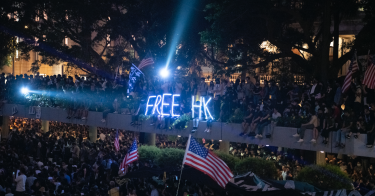It is often said that Hong Kong is becoming just another Chinese city.
It’s true. The people of Hong Kong had no say in the return of their city to the mainland in 1997. And as recent events illustrate, they have very little say over its future relationship with Beijing.
Unfortunately, the same goes for the U.S.
In May, Secretary of State Mike Pompeo declared Hong Kong no longer sufficiently autonomous to merit legal treatment separate from the mainland. As a result, the administration is now sifting through the elements of U.S.-Hong Kong ties, export controls, law-enforcement cooperation, financial regulations, etc., deciding whether and how they must change.
Hopefully, the executive order that comprises these new policies will distinguish between areas of no risk to American interests or values, e.g., the treatment of most trade between the U.S. and Hong Kong, and areas like extradition, which must change. After all, under Beijing’s new national-security law, anyone extradited to Hong Kong could find himself tried on the mainland.
By all means, Washington must restructure its relationship with Hong Kong to prevent the mainland from unduly benefiting from it. And there are a range of options that should be pursued to punish Chinese officials and others complicit in the subversion of Hong Kong’s autonomy.
None of this, however, will impact Hong Kong’s current trajectory.
The stakes for the Chinese Communist Party (CCP) are too high for it to change course. Xi Jinping has staked his political position on a crackdown on political liberty at home. He is not going to allow open opposition to the party’s dictates in Hong Kong to persist either.
One could hope for a future leadership that would reverse what the CCP is doing to Hong Kong under Xi. But neither is that in the cards. Returning to the commitments of the Sino-British Joint Declaration that enshrined Hong Kong’s “high degree of autonomy” would appear no less perfidious to CCP cadres than retreating from Tibet or relinquishing Beijing’s claim to Taiwan.
The troubling thing is that it’s not clear protesters in Hong Kong ever understood the limited impact American power could have on Beijing’s calculations. One need only recall the heartwarming displays of protesters waving American flags and singing the Star-Spangled Banner. Many literally cheered when Congress passed the Hong Kong Human Rights and Democracy Act.
Early on, President Trump tamped down expectations of U.S. influence, except in the event of an armed mainland intervention. In the end, however, he let events in Washington get away from him. Instead of the executive branch controlling Washington’s response, Congress took the initiative and dictated the tenor and pace. The president was given bills passed so overwhelmingly that he was compelled to sign them.
This is not to lay fault at the feet of the President or Congress. It is certainly not the fault of the protesters themselves. Beijing had set out on a course to bring Hong Kong to heel long before last spring when protests started.
But it did not necessarily have to unfold the way it did. There was a point in the fall when the proposed China extradition bill that set all this into motion was formally withdrawn that looked like the basis for the protesters to declare victory, and live to fight another day. Instead, they held out for all “five demands, not one less.”
How much of the decision to spurn this opportunity stemmed from unrealistic expectations of American influence? Hard to know. The grievances of the Hong Kong people have nothing to do with the U.S. They had plenty of their own reasons for pressing on.
Still, developments in Hong Kong are an occasion to raise a fundamental question that will have application throughout the long struggle with China on which the U.S. is now embarking: What responsibility do Americans—and not just their government—have to understand and make clear the limits of American power?
Yes, Hong Kong is becoming just another Chinese city. There are lessons to go around.
This piece originally appeared in the Daily Caller



